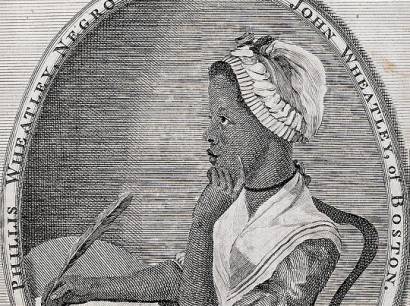This Week's Story
Phillis Wheatley: age seven, cargo on a slave ship; age thirteen publishing poetry

This Week’s Story relives American history and the Bible through brief inspiring stories presented on mp3 audio recordings and text for reading.
Phillis Wheatley, Slave and Published Poet!
I was left to die,
Shoved among the rotten remains of food and excrement;
Cast with bodies already forgotten,
I was to be a body forgotten;
I, being female,
seven years of age,
ill with tuberculosis;
unwanted cargo,
even for a slave ship;
I, being from Africa,
dying on a schooner
directed towards Boston,
To be sold like a bit of bread,
Upon auction day,
With a dirty carpet draped over my body,
Frail,
Innocence lost;
Sold,
On that day, July 11, 1761;
Susannah and John Wheatley bought me;
I was to be a house slave to serve Susannah;
“Phillis” I was named;
Phillis…
The title of the slave ship that carried me;
Wheatley…
My new owner’s surname,
Named as customary for human property.
Nathaniel and Mary, Susannah’s twins, taught me.
Within sixteen months, I wrote and spoke English fluently.
I ate as much literature as I could.
I swallowed Homer, the Bible, John Milton, and Alexander Pope.
They whispered to me,
“Be clever, child.
“Be tenacious, girl.
“Be hopeful, African.”
I was classically tutored;
A prodigy,
I wrote Latin and Greek and learned French;
And with this
I, being eleven
Wrote poetry!
I was given a desk, allowed to spend time thinking, writing, and learning. This was unusual for a female slave to have in the 1700’s. The truism of the time was, “If a slave learned to read, he would become dissatisfied with his condition and desire freedom.”
I was paraded at parties and gatherings. My owners were proud of my quickness to learn and ability to write in classical poetic form. I was their ornament. I was an example of my race that original thought was not isolated to white men.
I was not an inanimate object with utilitarian use. I was alive!
I was published about the age of thirteen in New England newspapers and periodicals. I became a Christian. God strengthened me and helped me to communicate to my readers. I felt inspired and hopeful. I had opportunities to write unlike any female slave.
My mistress Susannah desired that a book of my poetry be published. I had to prove before a court of influential thinkers that I wrote my poems. I was asked to write in Latin, Greek, and iambic pentameter. I successfully did.
Literary and governmental leaders of the day knew of my existence. I was controversial. Voltaire and Thomas Jefferson referred to me in letters. George Washington invited me to visit him at his home. My book of poems was published on September 1, 1773. I was nineteen years old and the first African-American woman to be published.
At age 25 I was freed by my owner’s will when he died. I married a poor free man, who was sent to prison because he was not paying his debts. All three of our children died as babies. When my husband was in prison, I became sick and died at age 31. Through those struggling years I continued to write. My life was hard, but it was not bare. I had hope and purpose. The Revolutionary War was being fought. I wrote poetry in support of Americans’ right to freedom.
This is Barbara Steiner with a story written by Alyce Steiner about Phillis Wheatley, who did more than survive. Please check out thisweeksstory.com.
<< previous story] [next story >>
We invite your comments! [click here to comment]
This Week's Story is a non-profit supported by listeners. [click here to make a donation]
 click here to play audio
click here to play audio